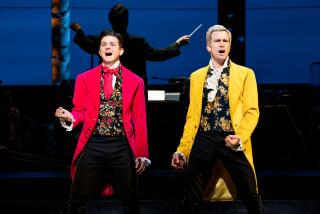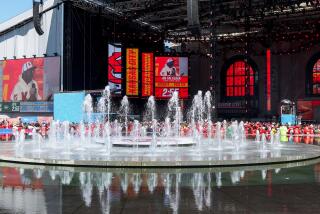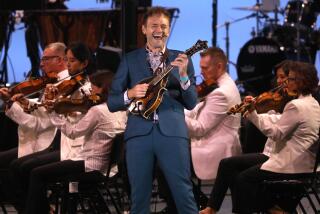River City Slickers
- Share via
Ardent fans of the NBC comedy “Will & Grace” might be aware that Eric McCormack, who plays Will, went to Broadway last year as a temporary replacement in the lead role of scamp Harold Hill in Susan Stroman’s revival of “The Music Man.” McCormack brought that performance to Los Angeles on Sunday night at the Hollywood Bowl, paired with powerhouse musical theater veteran Kristin Chenoweth as the prim librarian Marian who falls for him in Meredith Willson’s brassy ode to small-town Americana circa 1912.
In the role that made Robert Preston a star in 1957, McCormack proved himself a more-than-capable singer and dancer, but it was his nimble body language that was most notable in bringing to life one of musical theater’s most famous con men. Harold is described by the town mayor (Lenny Wolpe) as “slipperier than a Mississippi sturgeon,” and indeed McCormack oozed across the stage with a subtle athleticism and noxious charm, his white suit becoming more and more ironic as his murky intentions in River City became clear.
He is a gifted physical comedian, which he established early on, strutting through the famous set piece “Trouble,” disguising his chicanery as moral instruction on the evils of billiards. He repeatedly brought some welcome lift to a book that is truly a museum piece now, corny even for Iowa, where Willson is from and the story is set.
But it was Chenoweth who provided most of the musical highlights, lending her amplified operatic vibrato to “Goodnight, My Someone,” “My White Knight” and Marian’s climactic declaration of love, “Til There Was You,” which many people of a certain age once thought was a Beatles song after the group recorded it. (She will be seen singing these same songs this fall when she plays Marian to Matthew Broderick’s Harold in a television adaptation of “The Music Man” for ABC.)
The show’s signature tune remains the stridently jolly “Seventy-Six Trombones,” sung by McCormack and the assembled townsfolk to describe the marching band Harold has promised to fashion from the raw talent of River City’s youth. No doubt inspired by Willson’s former service in John Philip Sousa’s band, the song is aptly symbolic of a kind of musical bombast called for in the book but is reprised so many times in one form or another that it inevitably passes beyond parody into celebration--a problem for anyone who doesn’t think the song is more than noisy carnival kitsch.
The cavernous Bowl is anything but an easy setting for theater, and how far up the hillside the audience could read the nuances of the action is best known to the patrons who brought binoculars. Director Gordon Hunt often filled the big stage with more than a score of townsfolk and principals arrayed in a massive semicircle of chairs, and choreographer Kay Cole managed to stretch the high-stepping, petticoat-baring hoedown numbers to parade length.
At the climax of “Seventy- Six Trombones,” McCormack marched out onto the runway that juts across the inner circle of box seats, getting closer to the crowd. He and Chenoweth did the same during the “Til There Was You” scene, which ended with the special tension of wondering how the two actors managed to kiss without dislodging each other’s head microphones.
But even before Broadway went electric, “The Music Man” was wobbly as drama, creating a hero out of a fast-talking charlatan skilled in the art of fleecing Midwestern rubes until he is transformed by the love of a good librarian. It’s the broadest of sentimental ideas, and it’s astonishing--or maybe not, given the vicissitudes of taste and fashion--that in the 1957-58 season “The Music Man” debuted on Broadway, it trounced Bernstein-Sondheim’s “West Side Story” at the Tonys and even won a Grammy for best cast album, as Bowl orchestra conductor John Mauceri imprudently pointed out in his introduction.
Whether or not you regard that as a travesty of judgment, you can appreciate the skills Hunt and Co. brought to this one-night resurrection of a landmark American musical, treasured now more than ever perhaps as a homespun period piece. In addition to the accomplishments of McCormack and Chenoweth, Lyle Kanouse as the big-bellied salesman hot on Harold’s trail, Brooks Almy as Marian’s Irish widow mother and Ruth Williamson as the mayor’s gullible wife each gave robust, winning performances.
It may not have been “The Music Man” as Willson originally intended it to be experienced in a theater, but in the one-and-only theater for thousands at the Hollywood Bowl it was as good as could be expected.
More to Read
The biggest entertainment stories
Get our big stories about Hollywood, film, television, music, arts, culture and more right in your inbox as soon as they publish.
You may occasionally receive promotional content from the Los Angeles Times.










